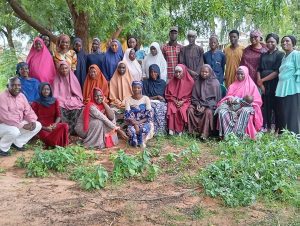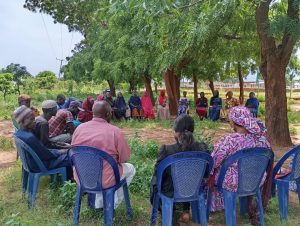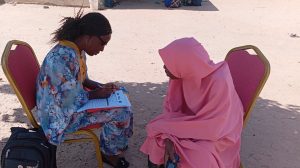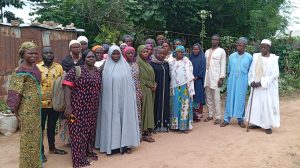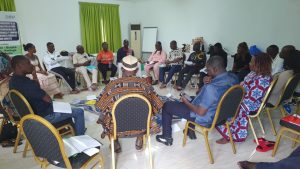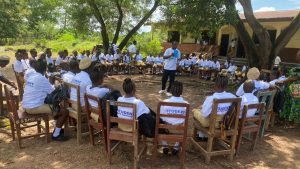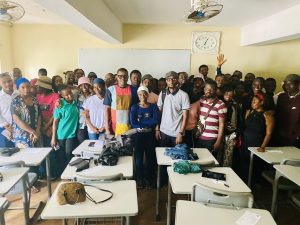Without paying a single kobo, I receive costly medicines for free. I can’t even begin to say how much that has helped me. In my community, where people insist on using traditional medicine which is sometimes ineffective, I have educated them and some of them have become beneficiaries too. {paraphrased}
Saratu Joshua, Billiri Community
Saratu, a 35-year-old mother of two and a survivor of the Boko Haram insurgency, was among the many individuals whose saw the trajectory of their lives altered by the conflict. Displaced from her home and forced to witness the brutal killing of her husband, she was left grappling with severe anxiety, depression, and Post-Traumatic Stress Disorder.
The Kishimi Shelter Care Foundation (KSCF) program, funded by the Africa Transitional Justice Legacy Fund (ATJLF) brought respite. Through a combination of counseling, safe space support, and medical interventions, Hannatu gradually found healing. She reported significant improvements in her mental well-being and, for the first time in years, felt empowered to start trading again. This enabled her to rebuild a sense of normalcy for herself and her children. Beyond her personal transformation, Hannatu has become a beacon of hope in her community, referring others with mental health challenges to KSCF for counseling and medical support.
Like Saratu, 224 other survivors benefited from KSCF’s Survivor Safe Space Initiative, which provided a secure environment for individuals to share experiences and access professional counseling. Professional counselors from government institutions conducted one-on-one counseling sessions tailored to each participant’s needs. The program covered critical topics, including: life events and coping strategies, building resilience, forgiveness and peace-building, psychological first aid, skill acquisition and livelihood empowerment, self-care practices, grief management and suicide prevention.
Beyond counseling, KSCF extended its reach through community-based MHPSS workshops, trauma training for lay counselors, and a comprehensive medical support and tracking exercise. This initiative included home visits and escort services to ensure continuity of care. Between August and December 2024, KSCF identified 106 beneficiaries across three LGAs, ensuring they received monthly routine medications through The Specialist Hospital and Aliyu Mega Pharmaceuticals in Gombe. Profiling exercises involving 105 individuals provided valuable insights into service access patterns and evolving needs. Many beneficiaries now report regaining stability and returning to their daily routines with a renewed sense of purpose.
Kishimi Foundation’s impact, however, extends beyond individual recovery. The program is fostering a sustainable mental health ecosystem by training lay counselors, equipping community leaders with the knowledge to support trauma survivors, and enhancing the capacity of local healthcare workers. Alhaji Abdulhamid Aliyu, a community leader in Borno State, expressed gratitude for the training, which helped him better understand and support trauma-affected individuals in his community. Elizabeth Pilaw, a health worker, noted that the training enhanced her ability to provide quality mental health care to her patients.
By addressing the psychosocial needs of survivors and creating a MHPSS network, KSCF is bridging a critical gap in the response to trauma and violence in Northeast Nigeria. The initiative is not only helping survivors rebuild their lives but also fostering a community where mental health challenges no longer serve as a barrier to resilience and productivity. Between now and 2026, KSCF aims to amplify its impact by training 150 lay counselors and providing MHPSS support to 300 additional survivors, further strengthening the foundation for sustainable mental health services.
Author
-
Pelumi Obisesan is the Programs and Communications Lead at the Africa Transitional Justice Legacy Fund.
View all posts

